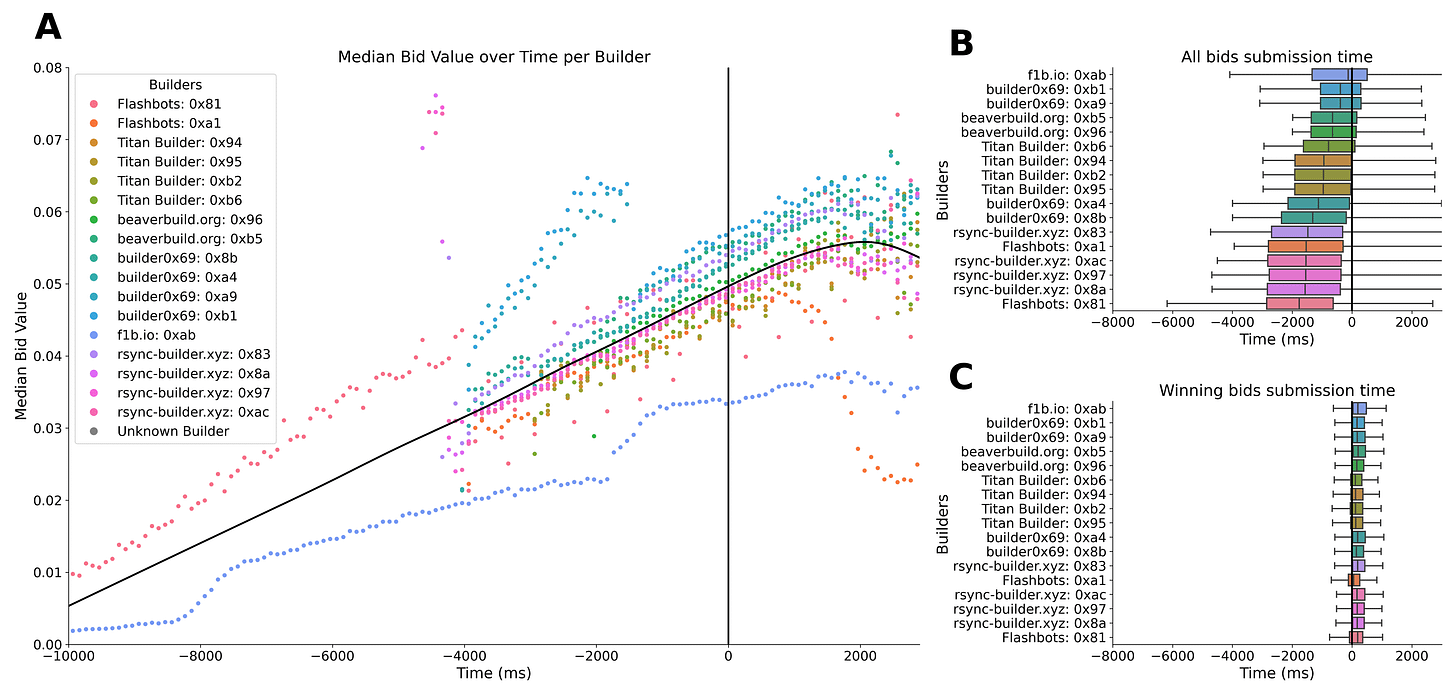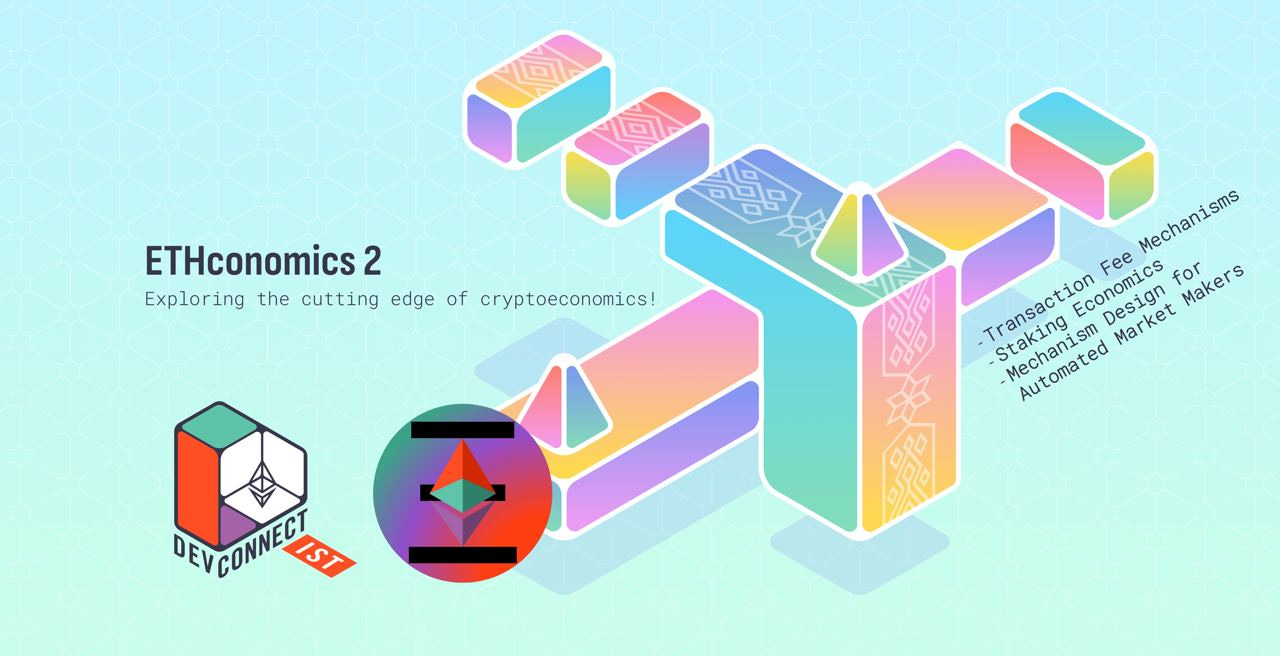RIG Update #2 — Science of Blockchain Conference (SBC) 2023
Builder behavioural profiles, PBS auction models, and a new generation of rollup economics...
Welcome all to the second update from our team, following the Science of Blockchain Conference (SBC) in Stanford, Palo Alto.
Some of us made the long trip over from Europe, while a lucky few were on home turf… Regardless, we all had a great time meeting one another, and spending time with the larger research team of the Ethereum Foundation. Sparks fly when we’re all in the same room, read on to discover some of the items that came out of it!
Behavioural profiles of PBS builders
Before jumping into SBC developments, let’s start with a post by Thomas, Empirical Analysis of Builders’ Behavioural Profiles (BBPs).
The introduction of MEV-Boost at the Merge allows validators to outsource the construction of their block to entities known as builders. These builders are not doing it for free: They hope to extract value known as MEV (Maximal Extractable Value), understood as the value extractable by the agent responsible for selecting and ordering transactions in a block. With MEV-Boost, the validator chooses which builder to outsource to by listening to their bids, which are based on the value these builders expect to extract. The auction takes place for every new block, i.e., every 12 seconds, and has now induced a market which is important to monitor.
In his post, Thomas discusses many facets of builder behaviour in this auction, which is open-bid and features cancellations (though this is a point of contention). Do builders bid strategically? What do they optimise for? What does the data reveal about builder access to exclusive order flow, which they alone know about? These metrics are folded under a comprehensive Builder Behavioural Profile (BBP), which informs the complex dynamics observed during the auction, and yield clues as to where the market may be going. Understanding this market is critical to assess the health of the Ethereum transaction supply network, the study of which we have undertaken with our ROP-5.
Check out Thomas’s work!
Rollups are real — Rollup economics 2.0
Davide is on a quest to prove once and for all that yes, rollups are real. His first shot is an update to Barnabé’s “Rollup economics” model, taking into account recent developments in the rollup space.
From Davide’s post:
We propose a new framework that will help make sense of the new world in which rollups get ready to scale. There is a lot of experimentation still going on, but several patterns are emerging. We will analyze key patterns and hopefully provide a tool that helps to understand where things might be headed and helps frame/answer current open questions. This is the first in a series of posts called “Rollups are Real”. Following posts in the series will go deeper on Aggregation and Interoperability, Decentralization and MEV Resiliency, Governance and Resource Allocation.
Check out the post!
If you’re looking for some alpha on his following posts, Davide also participated in MEV SBC’23, an SBC side-event organised by our friends at Flashbots.
A dynamic auction model for PBS
Julian also intervened at the MEV workshop, presenting ongoing work on a formal model of the PBS auction. Julian discusses how bidding behaviour should take into account that PBS and order flow auctions are common value auctions, leading to the winner’s curse.
Fun and games with inclusion lists
Barnabé published a new ethresear.ch post discussing models of inclusion lists. These inclusion lists are a proposed mechanism to increase censorship-resistance of the Ethereum chain, by helping proposers signal the existence of transactions for inclusion by their builders, who may otherwise decide to censor them. This signal being public, it is used to constrain the validity of blocks, which must include transactions from the list or prove that they did not have enough room for these transactions.
Working out that the most appropriate model is forward inclusion lists, where a proposer makes a list for the next block producer rather than their own, Barnabé discusses games this model may induce. First, builders may attempt to “stuff” their blocks to evade the list. While this is costly, the builder may still hope to win the block auction if their revenue is high enough to compensate. Second, proposers may attempt to bribe or extort one another, to either incite the previous proposer to keep the list empty for the next, or by the previous proposer threatening the next to make the list full and making them miss out on potentially juicier payments from censoring builders.
Check out the post!
PEPC updates
While PEPC continues to percolate in the ecosystem, teammates and collaborators are busy finding new use cases and specifying related mechanisms.
PEPC-DVT
ROP-4 grant recipient Diego released a post detailing PEPC-DVT, a novel approach to implementing proposer commitments without making changes to the Ethereum protocol. The key is to rely on distributed validator technology (DVT) networks, sometimes described as “validator multi-sigs”. With a DVT network, a validator essentially splits their signing key with other nodes in their network, preventing them from accidentally signing on detrimental messages by requiring a quorum of nodes to sign the message too.
If the DVT network refuses to sign messages which do not abide by a proposer’s registered commitments, the proposer is physically unable to propose a block violating their commitments. Diego details in the post how to register such commitments, with a new library (named Emily) dedicated to making commitments in the EVM.
PEPC Open Problems (MEV SBC talk)
Barnabé followed his teammates at MEV SBC with a talk presenting PEPC and developments related to the previously released PEPC FAQ.
Events
ETHconomics 2 @ Devconnect Istanbul
In April 2022, our team organised ETHconomics at Devconnect Amsterdam, a full-day event stacked with amazing speakers discussing all facets of Ethereum economics. Get ready now for a new format with ETHconomics 2, a meeting place for researchers and Researchooors! Hear from the leading experts on transaction fee mechanisms, staking economics and mechanism design for AMMs, in a relaxed and conversational setting. Apply now to secure your spot!
Columbia Cryptoeconomics 2023
We’re also happy to announce the return of Columbia Cryptoeconomics, a 2-day conference organised by Columbia University and the Ethereum Foundation. Last year’s event dug deep into protocol research and mechanism design, establishing itself as one of the prime conferences on cryptoeconomics. With an extra day on the schedule, our 2023 edition is sure to be unmissable. Find out more and apply at columbiacryptoeconomics.org!
Extra bytes
Caspar presented our latest paper, “Time is Money: Strategic Timing Games in Proof-of-Stake Protocols”, during the main conference of SBC. Find the video below, or revisit our romanced version from the previous RIG update.
Hasu and
invited Mike Neuder (EF) and Chris Hager (Flashbots) on the Uncommon Core 2 podcast to discuss PBS. The episode goes in-depth into recent developments such as optimistic relays, PEPC and funding mechanisms for non-protocol actors.Mike and Barnabé authored “Slashing penalty analysis; EIP-7251”, a post presenting a revised schedule of slashing penalties to decrease the slashing risk borne by stakers who choose to consolidate with the Maximum Effective Balance (MaxEB) proposal.
Stephane Gosselin from Frontier Research presented their new relay during the Lido Node Operator Community Call #9. According to Stephane, Frontier is looking into PEPC as a way to provide more functionality to their relay.
Blocknative announced the release of a comprehensive archive of mempool data. It is for now available upon request on this page.
Next stop
Thank you for reading our news! Our next big thing is mid-November’s Devconnect Istanbul, where our ETHconomics event will be held. That said, with Protocol Berg in sight and another stop for our Timing games paper at Advances in Financial Technologies (AFT) 2023, you might hear from us before then 😉
In the meantime, check more of our work on our website:







